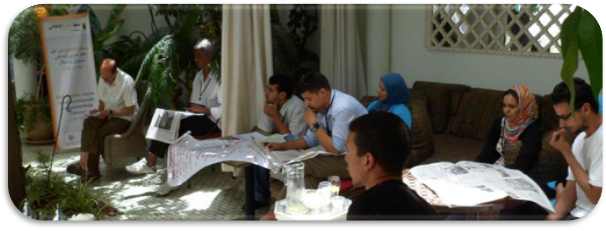
Event date: 18 – 20 May 2012
Country: Morocco

By Lesley Abdela
The Media Diversity Institute (MDI) organised a three day workshop in Marrakech, Morocco, between 18 – 20 May 2012, aimed at NGO activists willing to learn more about how to gather media attention as related to the particular social issues they work with. The course was led by Lesley Abdela, an international media relations expert and journalist, and Safi Naciri, Editor-in-Chief at Moroccan SNRT National Radio.
About half of 16 NGO activists that participated travelled 14 hours by bus from the Sahara regions. Others were residents in Marrakech.
National TV is heavily government-influenced and media in Morocco is highly commercially- oriented. In a dialogue with local media, participants heard it is easy to get media coverage of commercially attractive topics such as football/sport, but not easy to gain coverage of deeper issues in society.
oriented. In a dialogue with local media, participants heard it is easy to get media coverage of commercially attractive topics such as football/sport, but not easy to gain coverage of deeper issues in society.
Everyone was keen to learn how to get media coverage for the particular social issues on which they work. Out of 45,000 Associations active in Morocco, only 8 get any attention from the national media.
The workshop focused on highly-practical media communication skills for NGOs such as how to make your issues interesting to the media, how media functions, how to conduct effective TV and radio interviews, and how to build professional relationships with editors and journalists.
All the activists work on important social issues – some are part of the Morocco Human Development Initiative. One NGO works on prevention of torture. Morocco has come a long way in stopping torture but there is a way to go. If you get tortured or ill-treated by police officers, people are still wary of making any complaints to the authorities.
Another NGO helps educate and train former street children. As part of the project children were taken to visit the hydro-electric dam to see how electricity is produced, and then they were offered internships in the electricity industry.
Another participant was a representative of an NGO that works on Mediation in schools to prevent violence between teachers and students and between students and students. Also participating was the representative of a women’s NGO which is part of the national campaign to abolish Article 475 of the Moroccan penal code. Article 475 allows for a rapist to escape prosecution and justify a traditional practice where the rapist promises to marry his victim to ‘preserve the honour’ of the woman’s family. In a recent case a 16-year-old girl killed herself after being forced to marry her rapist.
Another participant was a representative of an NGO that campaigns for ramps to enable citizens in wheelchairs to access hospitals and other official buildings in a major Sahara city.
 The course ended with each of the participants telling the workshop what they intend to do in relation to the Media when they are back at work.
The course ended with each of the participants telling the workshop what they intend to do in relation to the Media when they are back at work.
The residence Riad Ifoulki where the MDI workshop was held is at the end of a tiny side alley inside the bustling Marrakech Medina. A riad (Arabic: رياض) is a traditional Moroccan house or palace with interior garden courtyards. The word riad comes from the Arabic term for garden. One of the courtyards under the trees in the Riad Ifoulki was used for much of the training. There is no clue on the great wooden door that provides access to the riad from the small alley of what lies inside. When you step inside you enter a peaceful paradise – a 500 year old large rambling building of stone staircases, courtyard fountains, trees, flowers and throngs of birds. The setting was very relaxed and informal – a little run-down in an elegant sort of way; the perfect atmosphere for a very productive and pro-active MDI workshop of discussions and presentations and feed-back.
The event was organized with the financial support of the European Union Delegation and UK Embassy in Rabat. It is one of 7 media relations workshops, among many other activities, including training for journalists and TV programmes, that will be organised during the life of the project. The objectives of the project are to encourage a public debate on the future of the Moroccan media, ensure greater coverage of social diversity in the media, improve freedom of expression and access to information, ensure greater responsibility by the media through self-regulation, and improve respect of media freedom by the government.